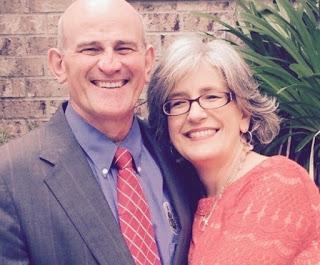
John and Christi Gibson
(From theblaze.com)
John Gibson, a teacher at New Orleans Baptist Theological Seminary, killed himself on or about August 24, roughly six days after his name appeared on a list of Ashley Madison (AM) customers released by a hacking group called Impact Team. A number of suicides, including two in Canada, have been linked to the AM hack, but reporting has been murky on most of the cases. The death of John Gibson marks by far the most widely and solidly reported suicide tied to Ashley Madison revelations.
In an article published last week, fusion.net reporter Kristen V. Brown wrote that Gibson had suffered from a number of addiction problems for years--some of them apparently related to sex. Gibson's wife, Christi, says her husband died, not from the hack, but from a life that had become shrouded in secrecy and false appearances. From the Fusion article:
Christi Gibson lost her husband, a New Orleans pastor, after his name was released in the leak. John Gibson had long struggled with sex addiction and depression. She only discovered her husband’s presence on the site upon reading the note she found along with his body. In it, he confessed his feelings of deep shame and remorse.
After her husband’s suicide, Gibson agreed to interviews with nearly every media outlet that called. She was on a mission to prevent secrets from having the power to destroy people’s lives. If her husband had been honest, she reasoned, he would probably still be alive.
“My life was shattered by secrecy and lies — not by the hack,” she wrote me via e-mail.
In her view, the problem isn’t so much that hackers unleashed stores of sensitive information, but that any of us keep secrets from one another in the first place.
Christi Gibson provided more details in an interview with The Washington Post:
For 25 of their almost 30 years of marriage, Gibson and her husband struggled with his sex addiction. She knew that he struggled and had relapsed over and over again. She did not know that he had used Ashley Madison until she read his suicide note, however. In it, her husband talked about his depression and his deep remorse and shame over having his name be among those found in the adultery Web site’s database.
“He struggled with addiction and with depression and those were two things that he couldn’t — as much as he was willing to help other people and do for other people — he couldn’t conceive that somebody would help him and do it for him in that kind of situation,” Christi said. “The shame of this really was just more than what he could take.”
Christi Gibson has become an outspoken advocate for truth in relationships. It was her husband's secrecy, more than the hack, that led to his death, she says. From the Post article:
As a minister and a professor at New Orleans Baptist Theological Seminary, the possibility that his secret life might have been exposed in the leak was simply too much.
And it was for that reason that Gibson and her children decided to go public with their family’s once-private shame and tragedy.
“The shame is in the secrecy and the hiddenness and the lie of this,” Gibson said. “Ashley Madison doesn’t advertise, ‘Hey come have an affair and let’s make it public.’ The whole idea, the allure of a site like this, is the anonymity and the darkness and the hiddenness of it.
“We believe that there’s freedom in the truth,” she added. “If we can speak out and say ‘find a safe person and talk to them, get help with what you’re going through,’ then it doesn’t make our pain go away, but it redeems it.”
Gibson's ties to the church probably made it more difficult for him to work through his struggles with addiction:
“I think what happens to someone who is a minister is that they start thinking of themselves as having to be perfect,” Gibson said. “They start believing that in order for them to help others, in order for them to lead others and minister to others, they have to be flawless themselves.
“It’s wrong thinking,” she added. “Every single story in the Bible of a leader or someone that God really used is a story of someone who is really flawed.”
So, could she have forgiven him?
“I think,” she said, pausing for a moment. “And I hope that John and I would have been able to work through this together had he come to me and said, ‘I’ve done this. I’m so sorry. Can we work through this together?’ I’ll never know because he didn’t let me do that.
“I don’t want to get out here and say, ‘Oh yeah, I could have forgiven it,’ and make myself look like a person who can do anything, because I don’t know,” she added. “I hope and pray that I would have been able to forgive because in the past, God’s given me the grace to be able to do that.”
